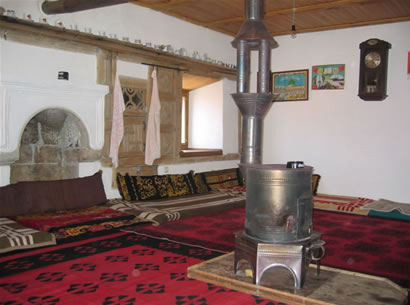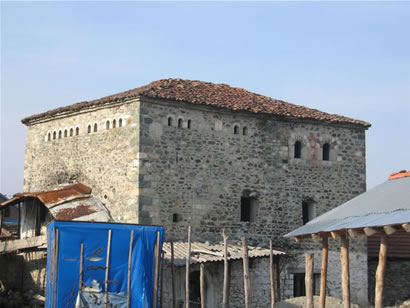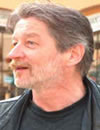 Traditional men's room in Albanian kulla
|
 Kulla - traditional stone house
|
Scholars have been fascinated by the traditional patriarchal Balkan family and have given it many different names. Most scholars call it zadruga. Karl Kaser also calls it Balkan family household. It is sometimes referred to as "multiple family household", and "complex” or "joint family." Here we portrait some of the scholars on whose work we drew during our own research.

Karl Kaser is an historian and anthropologist with a background in Southeast European history. He is director of the Center for the Study of Balkan Society and Culture at Graz University and conducted research on gender relations, patriarchal structures, clientelism, family and kinship, power and authority, and EU enlargement. Among his most important books are Hirten, Kämpfer, Stammeshelden – Sheppards, Fighters, tribal Heroes (1992) and Familie und Verwandschaft auf dem Balkan – Family and Kinship in the Balkans (1995).
Books by Karl Kaser at Amazon.com

Janet Reineck is an anthropologist with a background in humanitarian aid. She lived in Kosovo for seven years between 1981 and 1997, first conducting research for her dissertation The Past as Refuge (1991), later coordinating relief and community development programs for Oxfam, the International Rescue Committee and the Soros Foundation. Between 1997 and 2002 Reineck served as Director of Development at Direct Relief International, a medical aid agency based in Santa Barbara.
Berit Backer (1947-1993) was a Norwegian anthropologist who researched the social organisation of the village Isniq in West Kosovo. Her study Behind Stone Walls – Changing Household Organisation Among the Albanians of Kosova was first submitted as a masters thesis to the Institute of Social Anthropology at the University of Oslo in Norway in April 1979, but was never made available to the public at large. During the 1980s, Backer became a leading human rights activist and this engagement made it impossible for her to find time to prepare a definitive form for the publication of the thesis during her lifetime. Backer's study was finally published in 2003.
![]() Download "Behind Stone Walls"*
Download "Behind Stone Walls"*
One of the best studies on the impact of economic crisis on family structures is that of Vera Erlich, a Croat social scientist who led a huge research project on changing family structures in Yugoslav villages in the late 1930s. Published in the 1960s, the study Porodica u Transformaciji - Family in transition shows how a combination of factors – growing dependency of rural households on cash incomes, rising rural populations, a general economic crisis and the curtailment of opportunities to migrate from rural areas either abroad or to cities – eventually destroyed traditional households, breaking them up into many smaller units.
* Taken from www.elsie.de. Dr. Robert Elsie is a writer, translator, interpreter and specialist in Albanian studies.
|
Report: Cutting the lifeline. Migration, families and the future of Kosovo |
